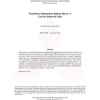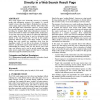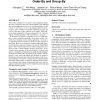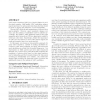354 search results - page 44 / 71 » Multi Word Term Queries for Focused Information Retrieval |
INTERSPEECH
2010
13 years 2 months ago
2010
In this work, we describe a subword unit approach for information retrieval of items by voice. An algorithm based on the minimum description length (MDL) principle converts an ind...
WWW
2011
ACM
13 years 2 months ago
2011
ACM
Web search engines have historically focused on connecting people with information resources. For example, if a person wanted to know when their flight to Hyderabad was leaving, a...
EJC
2010
13 years 2 months ago
2010
We all use our associative memory constantly. Words and concepts form paths that we can follow to find new related concepts; for example, when we think about a car we may associate...
SIGMOD
2007
ACM
14 years 7 months ago
2007
ACM
The Boolean semantics of SQL queries cannot adequately capture the "fuzzy" preferences and "soft" criteria required in non-traditional data retrieval applicati...
SIGIR
2012
ACM
11 years 10 months ago
2012
ACM
Query auto-completion (QAC) is a common feature in modern search engines. High quality QAC candidates enhance search experience by saving users time that otherwise would be spent ...




